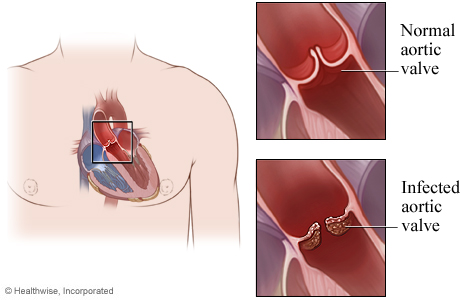Jump to
Bacterial endocarditis of the aortic valve

In endocarditis, bacteria that have entered the bloodstream settle on the inside of the heart, usually on the heart valves.
How can you care for yourself when you have bacterial endocarditis?
- If you are taking I.V. antibiotics at home with the help of a home health nurse, the nurse will teach you how to use the antibiotics and how to care for your I.V. catheter. Make sure you are comfortable using and caring for the I.V.
- If your doctor prescribed antibiotic pills, take them exactly as directed. Do not stop taking them just because you feel better. You need to take the full course of antibiotics.
- In the future, you may have to take antibiotics before certain medical, dental, or surgical procedures. Ask your doctor or dentist about this. Do not have any of these procedures without talking to your doctor or dentist first. Your doctor can give you a card to carry in your wallet which states that you need preventive antibiotics before certain procedures.
- Practice good oral hygiene. Brush and floss your teeth daily. Visit a dentist twice each year. Make sure your dentist knows that you have had endocarditis.
Bacterial endocarditis: When to call
Call 911 anytime you think you may need emergency care. For example, call if:
- You have symptoms of sudden heart failure. These may include:
- Severe trouble breathing.
- A fast or irregular heartbeat.
- Coughing up pink, foamy mucus.
- You passed out.
- You have symptoms of a stroke. These may include:
- Sudden numbness, tingling, weakness, or loss of movement in your face, arm, or leg, especially on only one side of your body.
- Sudden vision changes.
- Sudden trouble speaking.
- Sudden confusion or trouble understanding simple statements.
- Sudden problems with walking or balance.
- A sudden, severe headache that is different from past headaches.
Call your doctor now or seek immediate medical care if:
- You have a new or higher fever.
Watch closely for changes in your health, and be sure to contact your doctor if:
- You have skin or nail changes.
- You do not get better as expected.
©2011-2026 Healthwise, Incorporated
The content above contains general health information provided by Healthwise, Incorporated, and reviewed by its medical experts. This content should not replace the advice of your healthcare provider. Not all treatments or services described are offered as services by us. For recommended treatments, please consult your healthcare provider.
